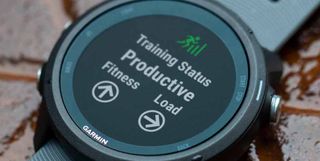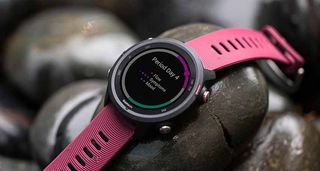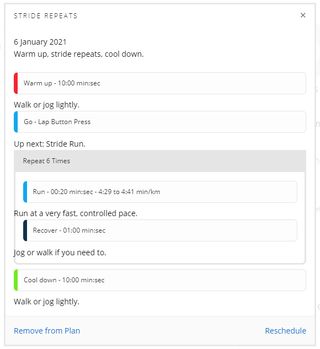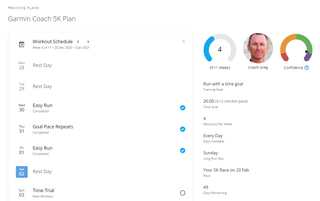How Garmin Coach is getting me back in shape in a Covid world
An illness wrecked my 5K times, but Garmin Coach is getting me back on track

On March 14 2020, I opted not to take part in parkrun: the free, timed weekly 5K run that I’ve done for the vast majority of Saturday mornings since winter 2014. The reason, with hindsight, should be obvious: the UK was just over a week away from its first coronavirus lockdown, and it didn’t feel responsible to take public transport to an event where I’d be sharply inhaling and exhaling around a whole bunch of fellow potential viral hosts.
It would turn out to be the last UK parkrun of the year, with events still yet to return to the country as the pandemic continues to dominate headlines and mindsets.
- The best sports watches you can buy
- Best fitness trackers: Get in shape for the new year
- PLUS: This is the best thing about the PS5 — just ask my girlfriend
I still don’t know for sure if I got coronavirus later that month — as a freelancer who works from home 90% of the time, it didn’t feel necessary to use one of the tests to find out. All I can say for sure is that I had mild flu-like symptoms, while my girlfriend developed the more obvious ones. Nonetheless, months later I would go on to develop symptoms that the CDC tags as common long covid ones: fatigue, chest pain, and joint pain.

These literal painful symptoms prompted another more figurative pain: my 5K times plummeted. I went from running the distance in a respectable 24-26 minutes to being unable to run 3km without needing to stop to walk. This added an unacceptable 5 to 10 minutes to the average times I’d nurtured over 212 parkrun events.
I know that in the greater scheme of things that there are worse things in the world than this, but nonetheless I found this a depressing turn of events. I genuinely feared that I would never get up to full speed again and that the pride in running a medium distance (let alone a long distance) without stopping was something that I would never enjoy again.
But then I remembered the device that was tracking my decline could also be used to put that trend into reverse. I bought a Garmin Forerunner 245 back in 2019, but hadn’t bothered with the built-in Garmin Coach because I hadn’t needed it. Now, however, I was certainly in need of coaching. I wasn’t sure how much of the inability to run more than 3K was in my head. Maybe in lockdown I’d just forgotten what the feeling of runner’s discomfort felt like?

For those unfamiliar with Garmin Coach, it’s a feature of select Garmin watches (the Forerunner 45 or Vivoactive 3 seem to be the cheapest compatible options) that schedules a training program based on your 5- or 10K goals, adapted to your performance and the metrics it picks up along the way. This can be as simple as just running it without stopping, or it can train you to a certain time goal. You select the days you can work out on, and Garmin comes up with instructions for that day all readable on the wrist.
So I set up a 3-month training program with the ultimate goal of hitting 5K in 26 minutes by February. This involves four runs per week with different goals each time; sometimes it will involve a slow-pace run for 30 minutes, and other times it will involve doing short sprints. For each segment, the watch has a handy meter to show you if you’re going too fast or too slow — just stay in the green segment and you'll be fine. Each session has a built-in warm up and warm down time, and there’s usually the option of doing an extra 5 to 10 minute ‘encore’ if you’re feeling strong.
Four weeks into the program, and I have to say the goal still feels a touch optimistic to me, but currently the Garmin ‘confidence’ rating about my chances of success has me just on the edge of “extremely confident”. Tomorrow’s run is a “Time Trial” where I have to run 1.61km as fast as I can, so I guess we’ll see how far I’ve come then.

But whether I succeed or not, I would recommend anyone in a similar running slump give it a go, provided they feel up to it (and if in doubt, consult your doctor). Not only is it making me feel better and more confident that my illness was just a blip, but the schedule is giving me a sense of purpose in a pandemic-packed world where it’s all too easy to feel adrift as days blur into one.
Now I'm rolling on to February 20 for race day. If all goes to plan, I might start it all over again with a more ambitious time target, or up it to 10K.
Sign up to get the BEST of Tom’s Guide direct to your inbox.
Upgrade your life with a daily dose of the biggest tech news, lifestyle hacks and our curated analysis. Be the first to know about cutting-edge gadgets and the hottest deals.
Freelance contributor Alan has been writing about tech for over a decade, covering phones, drones and everything in between. Previously Deputy Editor of tech site Alphr, his words are found all over the web and in the occasional magazine too. When not weighing up the pros and cons of the latest smartwatch, you'll probably find him tackling his ever-growing games backlog. Or, more likely, playing Spelunky for the millionth time.

